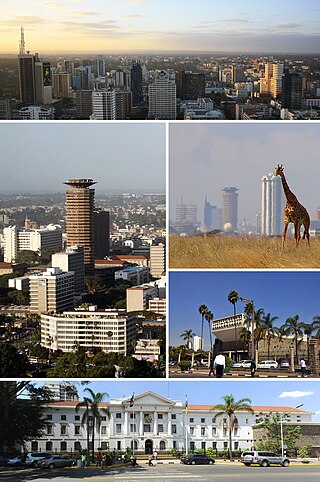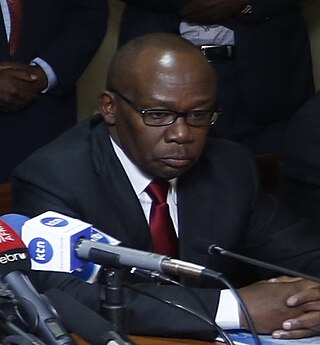
Nairobi is the capital and largest city of Kenya. The name is derived from the Maasai phrase Enkare Nairobi, which translates to 'place of cool waters', a reference to the Nairobi River which flows through the city. The city proper had a population of 4,397,073 in the 2019 census. The city is commonly referred to as The Green City in the Sun.

The Kenya national football team represents Kenya in association football. It is controlled by the Football Kenya Federation, the governing body football in Kenya, and competes as a member of the Confederation of African Football (CAF) and the Council for East and Central Africa Football Associations (CECAFA). It is colloquially known as Harambee Stars and plays its home games primarily at the Nyayo National Stadium in the capital, Nairobi.
Mungiki is a banned ethnic organisation in Kenya. The name means "a united people" or "multitude" in the Kikuyu language. The religion, which apparently originated in the late 1980s, is secretive and bears some similarity to mystery religions. Specifics of their origin and doctrines are unclear. What is clear is that they favour a return to indigenous African traditions.

Kenyatta University (KU) is a public research university with its main campus in Nairobi. It acquired the status of university in 1985, being the third university after University of Nairobi (1970) and Moi University (1984). As of October 2014, it was one of 23 public universities in the country.

Raila Amolo Odinga is a Kenyan politician who served as the prime minister of Kenya from 2008 to 2013. He served as the Member of Parliament (MP) for Langata Constituency from 1992 to 2013 and has been the Leader of Opposition in Kenya since 2013. He is the leader of Azimio la Umoja–One Kenya Coalition Party.

In Kenya matatu or matatus are privately owned minibuses used as share taxis. Often decorated, many matatu feature portraits of famous people or slogans and sayings. Likewise, the music they play is also aimed at quickly attracting riders. Over 70% of commuter trips are taken using matatu in cities like Nairobi.
Mumias Sugar Company Limited is a sugar manufacturing company in Kenya, the largest economy in the East African Community. It is the largest sugar manufacturer in Kenya, producing about 250,000 metric tonnes (42%) of the estimated 600,000 metric tonnes annual national output.
Makau W. Mutua is a Kenyan-American professor at the SUNY Buffalo School of Law and was its dean from 2008 to 2014. He teaches international human rights, international business transactions and international law. He is vice president of the American Society of International Law and a member of the Council on Foreign Relations.
A list of happenings in 2010 in Kenya:
Ongata Rongai is a town located in Kajiado North, Kajiado County, Kenya. The town is situated 17 km (10.6 mi) south of the Nairobi CBD and East of the Ngong hills and within the greater Nairobi Metropolitan Region. It lies 1,731 meters (5,682 feet) above sea level. According to the 2019 Census, it is the most populous town in Kajiado County and eleventh largest urban centre by population in Kenya.
Kakuzi PLC is a Kenyan agricultural cultivation and manufacture company. Its products include avocados, blueberries, macadamia, tea, livestock and commercial forestry. Its subsidiaries include Estates Services Limited. Kakuzi's majority shareholder is the British company Camellia.

Githu Muigai is a Kenyan lawyer who was the Attorney General of the Republic of Kenya until February 13, 2018, when he resigned. He holds a bachelor's degree in law from the University of Nairobi, a master's degree in international law from Columbia University School of Law, and was awarded a doctoral degree in law in November 2002. Prior to becoming Attorney General Githu Muigai served in the defunct Constitution of Kenya Review Commission and at the United Nations as Special Rapporteur on contemporary forms of racism, racial discrimination, xenophobia and related intolerance.

The Judicial Service Commission (JSC) of Kenya is an independent Commission established under Article 171 of the Constitution of Kenya. Its mandate as stipulated in Article 172 of the Constitution is to promote and facilitate the independence and accountability of the Judiciary and the efficient, effective and transparent administration of justice. The commission has 11 members with the initial team appointed in December 2010.

Evans Odhiambo Kidero is a Kenyan politician and former Governor of Nairobi County. He served as CEO of Mumias Sugar Company for 8 years, resigning in 2012 to join elective politics.
The Kenya Presidential Election Petition of 2013 was an election petition aiming to declare the Kenya presidential election 2013 invalid. The Petition was filed at the Supreme Court of Kenya on 16 March 2013.
Irreligion in Kenya is uncommon among Kenyans, with only 1.6% claiming no religion. Atheism is greatly stigmatized in Kenya.

The Wanga kingdom is a Bantu kingdom within Kenya, consisting of the Wanga (Abawanga) tribe of the Luhya people (Abaluyia). At its peak the kingdom covered an expansive area from Jinja in west to Naivasha in the East African Rift. The Wanga kingdom was a significant African empire and the most organized structure of government in pre-colonial Kenya politically, economically, and militarily.

David Kenani Maraga is a Kenyan lawyer and jurist. He was the 14th Chief Justice and President of the Supreme Court of Kenya from October 2016 until his retirement in January 2021.
Paul Kihara Kariuki is a Kenyan lawyer and a former court of appeal president and judge. He was nominated for the post of Office of Attorney General of Kenya by President Uhuru Kenyatta on 13 February 2018 following the resignation of Githu Muigai.
The Sarrai Group of Companies, commonly referred to as the Sarrai Group, is a privately owned conglomerate in East Africa and Southern Africa. The group maintains its headquarters in Kampala, Uganda, with subsidiaries in Kenya and Malawi. The group is headed by the executive group chairman, Sarbjit Singh Rai











